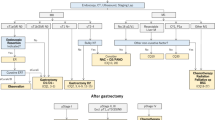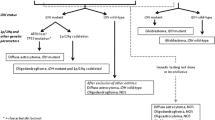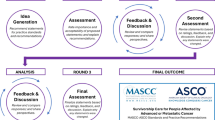Abstract
Background
Limited-resource countries (LRCs) are underrepresented in biomedical research, and data with respect to oncology are lacking. The aim of the present study was to assess the participation of LRCs in the American Society of Clinical Oncology (ASCO) annual meetings.
Methods
We analyzed the characteristics of abstracts originating from LRCs presented at the 2005–2007 ASCO meetings. We used a logistic regression model to identify country characteristics associated with contributions to the meetings.
Results
Eight percent of abstracts were generated by authors from LRCs. Abstracts from LRCs, compared with abstracts originating from high-income countries (HICs), were less commonly scheduled for oral and poster presentations (1.4% and 26.8% vs 8.8% and 52.8%, respectively; P < 0.001), and were less likely to report industry-provided funding (2.0% vs 12.7%; P < 0.001). However, the presentation type and the rate of reporting industry funding did not significantly differ between HIC abstracts and LRC abstracts involving one or more coauthors from HICs. In multivariate analysis, ASCO-related characteristics, but not geoeconomic parameters, were significantly predictive of country participation in the meetings.
Conclusion
These data show that the contribution of LRCs to ASCO annual meetings is very low. Although abstracts originating from LRCs involving authors from HICs were associated with a higher-impact type of presentation, their relevance to the cancer care concerns of LRCs remains to be ascertained.
Similar content being viewed by others
References
Parkin DM (2005) The burden of cancer in the developing world. Am Soc Clin Oncol Ed Book, pp 702–718
Porter P (2008) “Westernizing” women’s risks? Breast cancer in lower-income countries. N Engl J Med 358:213–216
The World Bank Group. Tobacco control in developing countries. http://www1.worldbank.org/tobacco/tcdc/009TO040.PDF
Bruckbauer S, Theisen C (2003) Cancer in the developing world: how should care be delivered and research conducted? J Natl Cancer Inst 95:1651–1653
Sledge GW (2005) Cancer research in the developing world. Am Soc Clin Oncol Ed Book, pp 698–701
The World Bank Data and Statistics: country classification. http://go.worldbank.org/ K2CKM78CC0
World Health Organization: WHO Statistical Information System (WHOSIS): Core health indicators. http://www.who.int/whosis/database/core/core_select.cfm
United Nations Development Programme: Human Development Report: Human development index value. http://hdrstats.undp.org/indicators/1.html
International Telecommunication Union: ICT Statistics. http://www.itu.int/ITU-D/icteye/Indicators/Indicators.aspx
Educational Testing Service: The TOEFL® test and score data summaries. http://www.ets.org/portal/site/ets/menuitem.c988ba0e5dd572bada20bc47c3921509/?vgnextoid=20beaf5e44df4010VgnVCM10000022f95190RCRD&vgnextchannel=d35ed898c84f4010VgnVCM10000022f95190RCRD
Patel V, Sumathipala A (2001) International representation in psychiatric journals: a survey of six leading journals. Br J Psychiatry 178:406–409
Sumathipala A, Siribaddana S, Patel V (2004) Underrepresentation of developing countries in the research literature: ethical issues arising from a survey of five leading medical journals. BMC Med Ethics 5:E5
Keiser J, Utzinger J, Tanner N, et al. (2004) Representation of authors and editors from countries with different human development indexes in leading literature on tropical medicine: survey of current evidence. BMJ 328:1229–1232
Moses H, Dorsey ER, Matheson DHM, et al. (2005) Financial anatomy of biomedical research. JAMA 294:1333–1342
Flanagin A, Carey LA, Fontanarosa PB, et al. (1998) Prevalence of articles with honorary authors and ghost authors in peer-reviewed medical journals. JAMA 280:222–224
Soteriades ES, Rosmarakis ES, Paraschakis K, et al. (2005) Research contribution of different world regions in the top 50 biomedical journals (1995–2002). FASEB J 20:29–34
Rahman M, Fukui T (2003) Biomedical publication — global profile and trend. Public Health 117:278–280
Rahman M, Fukui T (2003) Biomedical research productivity: factors across the countries. Int J Technol Assess Health Care 19:249–252
Man JP, Weinkauf JG, Tsang M, et al. (2004) Why do some countries publish more than others? An international comparison of research funding, English proficiency and publication output in highly ranked general medical journals. Eur J Epidemiol 19: 811–817
Author information
Authors and Affiliations
Corresponding author
About this article
Cite this article
Masmoudi, A. The contribution of limited-resource countries to the American Society of Clinical Oncology annual meetings. Int J Clin Oncol 14, 442–446 (2009). https://doi.org/10.1007/s10147-009-0902-7
Received:
Accepted:
Published:
Issue Date:
DOI: https://doi.org/10.1007/s10147-009-0902-7




